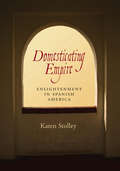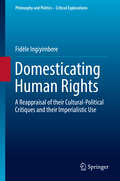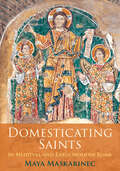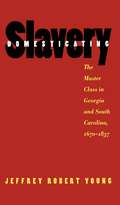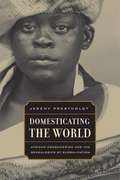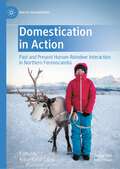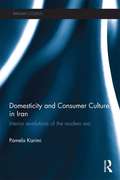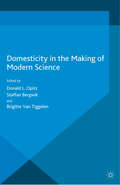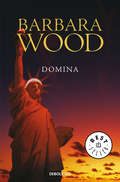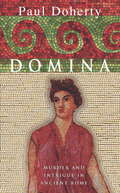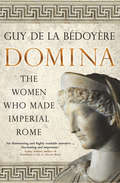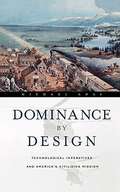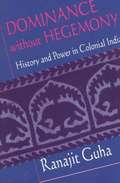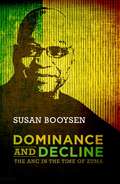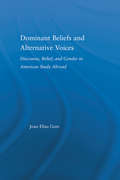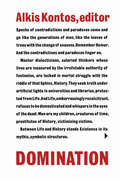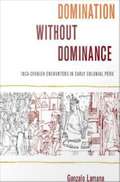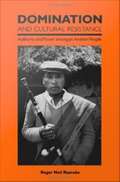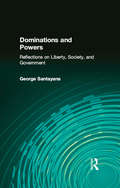- Table View
- List View
Domesticating Empire: Enlightenment in Spanish America
by Karen StolleyWhy has the work of writers in eighteenth-century Latin America been forgotten? During the eighteenth century, enlightened thinkers in Spanish territories in the Americas engaged in lively exchanges with their counterparts in Europe and Anglo-America about a wide range of topics of mutual interest, responding in the context of increasing racial and economic diversification. Yet despite recent efforts to broaden our understanding of the global Enlightenment, the Ibero-American eighteenth century has often been overlooked.Through the work of five authors--Jose de Oviedo y Banos, Juan Ignacio Molina, Felix de Azara, Catalina de Jesus Herrera, and Felix de Arrate--Domesticating Empire explores the Ibero-American Enlightenment as a project that reflects both key Enlightenment concerns and the particular preoccupations of Bourbon Spain and its territories in the Americas. At a crucial moment in Spain's imperial trajectory, these authors domesticate topics central to empire--conquest, Indians, nature, God, and gold--by making them familiar and utilitarian. As a result, their works later proved resistant to overarching schemes of Latin American literary history and have been largely forgotten. Nevertheless, eighteenth-century Ibero-American writing complicates narratives about both the Enlightenment and Latin American cultural identity.
Domesticating Empire: Enlightenment in Spanish America
by Karen StolleyWhy has the work of writers in eighteenth-century Latin America been forgotten? During the eighteenth century, enlightened thinkers in Spanish territories in the Americas engaged in lively exchanges with their counterparts in Europe and Anglo-America about a wide range of topics of mutual interest, responding in the context of increasing racial and economic diversification. Yet despite recent efforts to broaden our understanding of the global Enlightenment, the Ibero-American eighteenth century has often been overlooked. Through the work of five authors--Jose de Oviedo y Banos, Juan Ignacio Molina, Felix de Azara, Catalina de Jesus Herrera, and Jose Martin Felix de Arrate--Domesticating Empire explores the Ibero-American Enlightenment as a project that reflects both key Enlightenment concerns and the particular preoccupations of Bourbon Spain and its territories in the Americas. At a crucial moment in Spain's imperial trajectory, these authors domesticate topics central to empire--conquest, Indians, nature, God, and gold--by making them familiar and utilitarian. As a result, their works later proved resistant to overarching schemes of Latin American literary history and have been largely forgotten. Nevertheless, eighteenth-century Ibero-American writing complicates narratives about both the Enlightenment and Latin American cultural identity.
Domesticating Human Rights
by Fidèle IngiyimbereThis book develops a philosophical conception of human rights that responds satisfactorily to the challenges raised by cultural and political critics of human rights, who contend that the contemporary human rights movement is promoting an imperialist ideology, and that the humanitarian intervention for protecting human rights is a neo-colonialism. These claims affect the normativity and effectiveness of human rights; that is why they have to be taken seriously. At the same time, the same philosophical account dismisses the imperialist crusaders who support the imperialistic use of human rights by the West to advance liberal culture. Thus, after elaborating and exposing these criticisms, the book confronts them to the human rights theories of John Rawls and Jürgen Habermas, in order to see whether they can be addressed. Unfortunately, they are not. Therefore, having shown that these two philosophical accounts of human rights do not respond convincingly to those the postcolonial challenges, the book provides an alternative conception that draws the understanding of human rights from local practices. It is a multilayer conception which is not centered on state, but rather integrates it in a larger web of actors involved in shaping the practice and meaning of human rights. Confronted to the challenges, this new conception offers a promising way for addressing them satisfactorily, and it even sheds new light to the classical questions of universality of human rights, as well as the tension between universalism and relativism.
Domesticating Organ Transplant: Familial Sacrifice and National Aspiration in Mexico
by Megan Crowley-MatokaOrgan transplant in Mexico is overwhelmingly a family matter, utterly dependent on kidneys from living relatives--not from stranger donors typical elsewhere. Yet Mexican transplant is also a public affair that is proudly performed primarily in state-run hospitals. In Domesticating Organ Transplant, Megan Crowley-Matoka examines the intimate dynamics and complex politics of kidney transplant, drawing on extensive fieldwork with patients, families, medical professionals, and government and religious leaders in Guadalajara. Weaving together haunting stories and sometimes surprising statistics culled from hundreds of transplant cases, she offers nuanced insight into the way iconic notions about mothers, miracles, and mestizos shape how some lives are saved and others are risked through transplantation. Crowley-Matoka argues that as familial donors render transplant culturally familiar, this fraught form of medicine is deeply enabled in Mexico by its domestication as both private matter of home and proud product of the nation. Analyzing the everyday effects of transplant's own iconic power as an intervention that exemplifies medicine's death-defying promise and commodifying perils, Crowley-Matoka illuminates how embodied experience, clinical practice, and national identity produce one another.
Domesticating Saints in Medieval and Early Modern Rome (The Middle Ages Series)
by Maya MaskarinecHow elite Roman families used genealogy, architecture, and the urban fabric to appropriate the city’s saints for their ownDomesticating Saints in Medieval and Early Modern Rome explores the creative efforts of some of Rome’s most prominent noble families to weave themselves into Rome’s Christian past. Maya Maskarinec shows how, from late antiquity to early modernity, elite Roman families used genealogy, architecture, and the urban fabric to appropriate the city’s saints for their own, eventually claiming them as ancestors.Over the course of the Middle Ages, there developed a pronounced sense that churches and their saints belonged to specific regions, neighborhoods, and even families. These associations, coupled with a resurgent interest in Rome’s Christian antiquity as well as in noble lineages, enabled Roman families to “domesticate” the city’s saints and dominate the urban landscape and its politics into the early modern era. These families cultivated saintly genealogies and saintly topologies (exploiting, for example, the increasingly prolific identification of churches as the former residences of early Christian and late antique saints), cementing presumed connections between place, descent, and moral worth.Drawing from sources spanning the fourth to the late sixteenth century, Maskarinec brings into conversation saints’ lives, documentary evidence, family genealogies, monumental and domestic architecture, and medieval and early modern guidebooks, sources not often studied together. Bridging the divide between secular and sacred histories of Rome, Domesticating Saints in Medieval and Early Modern Rome repositions these materials within a new story, of how Romans made the city’s classical and Christian past their own and thereby empowered and immortalized their families.
Domesticating Slavery
by Jeffrey Robert YoungIn this carefully crafted work, Jeffrey Young illuminates southern slaveholders' strange and tragic path toward a defiantly sectional mentality. Drawing on a wealth of archival evidence and integrating political, religious, economic, and literary sources, he chronicles the growth of a slaveowning culture that cast the southern planter in the role of benevolent Christian steward--even as slaveholders were brutally exploiting their slaves for maximum fiscal gain. Domesticating Slavery offers a surprising answer to the long-standing question about slaveholders' relationship with the proliferating capitalistic markets of early-nineteenth-century America. Whereas previous scholars have depicted southern planters either as efficient businessmen who embraced market economics or as paternalists whose ideals placed them at odds with the industrializing capitalist society in the North, Young instead demonstrates how capitalism and paternalism acted together in unexpected ways to shape slaveholders' identity as a ruling elite. Beginning with slaveowners' responses to British imperialism in the colonial period and ending with the sectional crises of the 1830s, he traces the rise of a self-consciously southern master class in the Deep South and the attendant growth of political tensions that would eventually shatter the union.
Domesticating the World: African Consumerism and the Genealogies of Globalization
by Jeremy PrestholdtThis book boldly unsettles the idea of globalization as a recent phenomenon--and one driven solely by Western interests--by offering a compelling new perspective on global interconnectivity in the nineteenth century. Jeremy Prestholdt examines East African consumers' changing desires for material goods from around the world in an era of sweeping social and economic change. Exploring complex webs of local consumer demands that affected patterns of exchange and production as far away as India and the United States, the book challenges presumptions that Africa's global relationships have always been dictated by outsiders. Full of rich and often-surprising vignettes that outline forgotten trajectories of global trade and consumption, it powerfully demonstrates how contemporary globalization is foreshadowed in deep histories of intersecting and reciprocal relationships across vast distances.
Domestication in Action: Past and Present Human-Reindeer Interaction in Northern Fennoscandia (Arctic Encounters)
by Anna-Kaisa SalmiReindeer have been an integral part of the lives of people in Northern Fennoscandia in prehistoric and historic times. Today, reindeer herding practices are changing fast due to climate change, land use pressures and new technologies. This book outlines recent advances in the archaeology of reindeer domestication and development of reindeer herding among the Sámi of Northern Fennoscandia, focusing especially on the identification and understanding of various reindeer herding tasks and practices through archaeological evidence and traditional knowledge of reindeer herders. Covering more than a thousand years of history of reindeer herding, the book explores how reindeer herding practices have always been dynamic and adapted to the changing social, economic and environmental pressures. While reindeer herding practices have changed, they have also retained memory and tradition. The continuity and adaptation of reindeer herding testifies of the resilience of reindeer herders and their animals, and the importance of their relationship in the changing Arctic. This book will be of interest to scholars interested in archaeology, anthropology, and history of the Arctic, as well as local communities and reindeer herders.
Domesticity and Consumer Culture in Iran: Interior Revolutions of the Modern Era (Iranian Studies)
by Pamela KarimiExamining Iran’s recent history through the double lens of domesticity and consumer culture, Domesticity and Consumer Culture in Iran demonstrates that a significant component of the modernization process in Iran advanced beyond political and public spheres. On the cusp of Iran’s entry into modernity, the rules and tenets that had traditionally defined the Iranian home began to vanish and the influx of new household goods gradually led to the substantial physical expansion of the domestic milieu. Subsequently, architects, designers, and commercial advertisers shifted their attention from commercial and public architecture to the new home and its contents. Domesticity and consumer culture also became topics of interest among politicians, Shiite religious scholars, and the Left, who communicated their respective views via the popular media and numerous other means. In the interim, ordinary Iranian families, who were capable of selectively appropriating aspects of their immediate surroundings, demonstrated their resistance toward the officially sanctioned transformations. Through analyzing a series of case studies that elucidate such phenomena and appraising a wide range of objects and archival documents—from furnishings, appliances, architectural blueprints, and maps to photographs, films, TV series, novels, artworks, scrapbooks, work-logs, personal letters and reports—this book highlights the significance of private life in social, economic, and political contexts of modern Iran. Tackling the subject of home from a variety of perspectives, Domesticity and Consumer Culture in Iran thus shows the interplay between local aspirations, foreign influences, gender roles, consumer culture and women’s education as they intersect with taste, fashion, domestic architecture and interior design.
Domesticity in the Making of Modern Science
by Donald L. Opitz Brigitte Van Tiggelen Staffan BergwikThe history of the modern sciences has long overlooked the significance of domesticity as a physical, social, and symbolic force in the shaping of knowledge production. This book provides a welcome reorientation to our understanding of the making of the modern sciences globally by emphasizing the centrality of domesticity in diverse scientific enterprises.
Domina
by Barbara WoodOther women would have considered themselves blessed if they had been granted Samantha Hargrave's striking loveliness. But in the Victorian world, her beauty was just one more reason the male medical establishment could not see her as a doctor. Samantha vowed to open their eyes to her dedication, her skill, her desire to make the kind of contribution that only her knowledge both of medicine and of women's special problems could make. And Samantha would fight for her burning dreams until she won--even if it meant closing her heart to Dr. Joshua Masefield, the brilliant mentor whose aid had saved her career ... and whose passion threatened to destroy it. Even if it meant forsaking her memories of Dr. Mark Rawlins, in whose arms she had discovered what it meant to be a complete woman.
Domina
by Barbara WoodSamantha Hargrave nació en Londres en 1860, en un barrio humilde. Desde muy pequeña se había sentido atraída por el tremendo universo del dolor físico y la esperanzadora posibilidad de su remedio. Así que, cuando creció, no tuvo duda sobre qué quería ser. Sin embargo, estudiar -y ejercer- la medicina durante el siglo XIX resultaba prácticamente imposible para una mujer. Por ello, se vio obligada a trasladarse a Estados Unidos, donde, no sin dificultades y humillaciones, logró su ansiado título. Con todo, el camino de su triunfo -la plenitud del amor, el reconocimiento profesional, la lucha por una medicina más humana- sería aún largo y costoso.
Domina: Murder and intrigue in Ancient Rome
by Paul DohertyOne woman's thirst for power changes history forever...Domina is a dramatic historical novel about the turbulent life and death of Agrippina, Empress of Rome, from the master of historical fiction, Paul Doherty. Perfect for fans of Lindsey Davis and Steven Saylor.Agrippina - mother of Nero, wife of Claudius - has no choice but to fight with her wits to stay alive. Emerging victorious in the secretive plot to end the reign of Tiberius, she also proves to be a formidable opponent to her insane and cruel brother, Caligula. But as she rises to power as the wife of Claudius, her one weakness becomes apparent: her ambitious love for her son, Nero. In the treacherous arena of Ancient Rome, Agrippina knows that each player must fight to survive - or die. And be prepared to sacrifice anything or anyone...What readers are saying about Paul Doherty:'This story is thrilling stuff... a really entertaining novel''Brings history to life''Five stars'
Domina: Murder and intrigue in Ancient Rome
by Paul DohertyAgrippina - mother of Nero, wife of Claudius - has no choice but to fight with her wits to stay alive. Emerging victorious in the secretive plot to end the reign of Tiberius, she also proves to be a formidable opponent to her insane and cruel brother, Caligula. But as she rises to power as the wife of Claudius, her one weakness becomes apparent: her ambitious love for her son, Nero.In the treacherous arena of Ancient Rome, Agrippina knows that each player must fight to survive - or die. And be prepared to sacrifice anything or anyone...
Domina: The Women Who Made Imperial Rome
by Guy de la Bédoyère&“An illuminating and highly readable narrative about the role of women at the center of imperial Rome—fascinating and important.&” —Lesley Adkins, author of Handbook to Life in Ancient Rome Augustus, Tiberius, Caligula, Claudius, and Nero—these are the names history associates with the early Roman Empire. Yet, not a single one of these emperors was the blood son of his predecessor. In this captivating history, a prominent scholar of the era documents the Julio-Claudian women whose bloodline, ambition, and ruthlessness made it possible for the emperors&’ line to continue. Eminent scholar Guy de la Bédoyère, author of Praetorian, asserts that the women behind the scenes—including Livia, Octavia, and the elder and younger Agrippina—were the true backbone of the dynasty. De la Bédoyère draws on the accounts of ancient Roman historians to revisit a familiar time from a completely fresh vantage point. Anyone who enjoys I, Claudius will be fascinated by this study of dynastic power and gender interplay in ancient Rome. &“In contrast to most histories of Rome which focus almost entirely on the exploits of its male emperors, Domina examines the women who partnered them in power, from the perfect Roman wives Livia and Octavia to Cleopatra, Agrippina the Younger and the trio of Severan Julias who all stepped far beyond tradition to dominate the Roman world.&”—Joann Fletcher, author of The Story of Egypt &“Enjoyable, fluently written and well-balanced in approach. De la Bédoyère leaves no stone unturned by way of evidence, which he carefully evaluates with regard to its context and reliability.&”—Pat Southern, author of The Roman Army
Dominance By Design: Technological Imperatives And America's Civilizing Mission
by Michael AdasLong before the United States became a major force in global affairs, Americans believed in their superiority over others due to their inventiveness, productivity, and economic and social well-being. U. S. expansionists assumed a mandate to "civilize" non-Western peoples by demanding submission to American technological prowess and design. As an integral part of America's national identity and sense of itself in the world, this civilizing mission provided the rationale to displace the Indians from much of our continent, to build an island empire in the Pacific and Caribbean, and to promote unilateral-at times military-interventionism throughout Asia. In our age of "smart bombs" and mobile warfare, technological aptitude remains preeminent in validating America's global mission. Michael Adas brilliantly pursues the history of this mission through America's foreign relations over nearly four centuries from North America to the Philippines, Vietnam, and the Persian Gulf. The belief that it is our right and destiny to remake foreign societies in our image has endured from the early decades of colonization to our current crusade to implant American-style democracy in the Muslim Middle East. Dominance by Design explores the critical ways in which technological superiority has undergirded the U. S. 's policies of unilateralism, preemption, and interventionism in foreign affairs and raised us from an impoverished frontier nation to a global power. Challenging the long-held assumptions and imperatives that sustain the civilizing mission, Adas gives us an essential guide to America's past and present role in the world as well as cautionary lessons for the future.
Dominance Without Hegemony: History And Power In Colonial India (Convergences #17)
by Ranajit Guha Edward SaidWhat is colonialism and what is a colonial state? Ranajit Guha points out that the colonial state in South Asia was fundamentally different from the metropolitan bourgeois state which sired it. The metropolitan state was hegemonic in character, and its claim to dominance was based on a power relation in which persuasion outweighed coercion. Conversely, the colonial state was non-hegemonic, and in its structure of dominance coercion was paramount. Indeed, the originality of the South Asian colonial state lay precisely in this difference: a historical paradox, it was an autocracy set up and sustained in the East by the foremost democracy of the Western world. It was not possible for that non-hegemonic state to assimilate the civil society of the colonized to itself. Thus the colonial state, as Guha defines it in this closely argued work, was a paradox--a dominance without hegemony. Dominance without Hegemony had a nationalist aspect as well. This arose from a structural split between the elite and subaltern domains of politics, and the consequent failure of the Indian bourgeoisie to integrate vast areas of the life and consciousness of the people into an alternative hegemony. That predicament is discussed in terms of the nationalist project of anticipating power by mobilizing the masses and producing an alternative historiography. In both endeavors the elite claimed to speak for the people constituted as a nation and sought to challenge the pretensions of an alien regime to represent the colonized. A rivalry between an aspirant to power and its incumbent, this was in essence a contest for hegemony.
Dominance and Decline: The ANC in the time of Zuma
by Susan BooysenAs Jacob Zuma moves into the twilight years of his presidencies of both the African National Congress (ANC) and of South Africa, this book takes stock of the Zuma-led administration and its impact on the ANC. Dominance and Decline: The ANC in the Time of Zuma combines hard-hitting arguments with astute analysis. Susan Booysen shows how the ANC has become centred on the personage of Zuma, and that its defence of his extremely flawed leadership undermines the party’s capacity to govern competently, and to protect its long term future. Following on from her first book, The African National Congress and the Regeneration of Power (2011), Booysen delves deeper into the four faces of power that characterise the ANC. Her principal argument is that the state is failing as the president’s interests increasingly supersede those of party and state. Organisationally, the ANC has become a hegemon riven by factions, as the internal blocs battle for core positions of power and control. Meanwhile, the Zuma-controlled ANC has witnessed the implosion of the tripartite alliance and decimation of its youth, women’s and veterans’ leagues. Electorally, the leading party has been ceding ground to increasingly assertive opposition parties. And on the policy front, it is faltering through poor implementation and a regurgitation of old ideas. As Zuma’s replacements start competing and succession politics take shape, Booysen considers whether the ANC will recover from the damage wrought under Zuma’s reign and attain its former glory. Ultimately, she believes that while the damage is irrevocable, the electorate may still reward the ANC for transcending the Zuma years. This is a must-have reference book on the development of the modern ANC. With rigour and incisiveness, Booysen offers scholars and researchers a coherent framework for considering future patterns in the ANC and its hold on political power.
Dominant Battlespace Knowledge: The Winning Edge
by Martin C. Libicki Stuart E. JohnsonThe Department of Defense has been successfully exploiting rapidly developing advances in information technology for military gain. On tomorrow’s multidimensional battlefield—or “battlespace”—the increased density, acuity, and connectivity of sensors and many other information devices may allow U.S. Armed Forces to see almost everything worth seeing in real or near-real time. Such enhanced vision of the battlespace is no doubt a significant military advantage, but a question remains: How do we achieve dominant battlefield knowledge, namely, the ability to understand we see and act on it decisively?The papers collected here address the most critical aspects of that problem—to wit: If the United States develops the means to acquire dominant battlespace knowledge (DBK), how might that affect the way it goes to war, the circumstances under which force can and will be used, the purposes for its employment, and the resulting alterations of the global geomilitary environment? Of particular interest is how the authors view the influence of DBK in light of the shift from global to regional stability issues that marks the post-Cold War world.While no definitive answer has yet emerged, it is clear that the implications of so profound a change in military technology are critical to the structure and function of the U.S. Armed Forces. In working toward a definitive answer, the authors of this volume make an important contribution to a debate whose resolution will shape the decades to come.
Dominant Beliefs and Alternative Voices: Discourse, Belief, and Gender in American Study (RoutledgeFalmer Studies in Higher Education)
by Joan Elias GoreThis book examines why study abroad is a marginal activity in American higher education and evaluates the role gender has played in the development and maintenance of this marginality.
Dominant Narratives of Colonial Hokkaido and Imperial Japan
by Michele M. MasonRecasts the commonly dismissed colonial project pursued in Hokkaido during the Meiji era (1868-1912) as a major force in the production of modern Japan's national identity, imperial ideology, and empire.
Domination
by Alkis KontosOne is usually conscious of tyranny and oppression; domination is more subtle. It is an abandonment of our freedom, our will, and our love of justice, and yet socially, psychologically, and ontologically domination in some degree seems inevitable. There is now in the western world an uneasy sense that more domination is going on than necessary, and this work tries to outline the theoretic modalities of this human predicament. The twelve essays in Domination examine such questions as: Does the ego of the infant require for its development some experiences of dominance? Is it men or the system that causes the domination of women? How has capitalism with its property laws entailed limits on national and personal freedom? What do existentialism and critical theory have to tell us about violence and reason, or about magic and science, as modes of life that constrain everyone? What is racialism? And, if the world is beyond the powers of reason, what does modern man now make his public and private raison d'être? Those who are looking for amelioration of the quality and quantity of human freedom will find this book helpful in defining and cracking the chains. The contributors, in order of their appearance of their essays, are O. Weininger, Elizabeth Brady, R.T. Naylor, R.O. Matthews, C.B. Macpherson, Monika Langer, Keith McCallum, Ato Sekyi-Out, Christian Lenhardt, Ben Agger, David Cook, and Alkis Kontos.
Domination Without Dominance: Inca-Spanish Encounters in Early Colonial Peru
by Gonzalo LamanaOffering an alternative narrative of the conquest of the Incas, Gonzalo Lamana both examines and shifts away from the colonial imprint that still permeates most accounts of the conquest. Lamana focuses on a key moment of transition: the years that bridged the first contact between Spanish conquistadores and Andean peoples in 1531 and the moment, around 1550, when a functioning colonial regime emerged. Using published accounts and array of archival sources, he focuses on questions of subalternization, meaning making, copying, and exotization, which proved crucial to both the Spaniards and the Incas. On the one hand, he re-inserts different epistemologies into the conquest narrative, making central to the plot often-dismissed, discrepant stories such as books that were expected to talk and year-long attacks that could only be launched under a full moon. On the other hand, he questions the dominant image of a clear distinction between Inca and Spaniard, showing instead that on the battlefield as much as in everyday arenas such as conversion, market exchanges, politics, and land tenure, the parties blurred into each other in repeated instances of mimicry. Lamana's redefinition of the order of things reveals that, contrary to the conquerors' accounts, what the Spanairds achieved was a "domination without dominance. " This conclusion undermines common ideas of Spanish (and Western) superiority. It shows that casting order as a by-product of military action rests on a pervasive fallacy: the translation of military superiority into cultural superiority. In constant dialogue with critical thinking from different disciplines and traditions, Lamana illuminates how this new interpretation of the conquest of the Incas revises current understandings of Western colonialism and the emergence of still-current global configurations.
Domination and Cultural Resistance: Authority and Power among an Andean People
by Roger Neil RasnakeDomination and Cultural Resistance examines the social life of the Yura, a Quechua-speaking Andean ethnic group of central Bolivia, and focuses especially on their indigenous authorities, the kuraqkuna or elders. Combining ethnohistorical research with contemporary fieldwork, Roger Neil Rasnake traces the evolution of leadership roles within the changing composition of the native Andean social groupings, the ayllus-from the consolidation of pre-Hispanic Aymara polities, through the pressures of the Spanish colonial regime and the increasing fragmentation of the republican era, to the present.
Dominations and Powers: Reflections on Liberty, Society, and Government
by George Santayana"In what must be ranked as a foremost classic of twentieth-century political philosophy, George Santayana, in the preface to his last major work prior to his death, makes plain the limits as well as the aims of Dominations and Powers: ""All that it professes to contain is glimpses of tragedy and comedy played unawares by governments; and a continual intuitive reduction of political maxims and institutions to the intimate spiritual fruits that they are capable of bearing.""This astonishing volume shows how the potential beauty latent in all sorts of worldly artifacts and events are rooted in differing forms of power and dominion. The work is divided into three major parts: the generative order of society, which covers growth in the jungle, economic arts, and the liberal arts; the militant order of society, which examines factions and enterprise; and the rational order of society, which contains one of the most sustained critiques of democratic systems and liberal ideologies extant.Written at a midpoint in the century, but at the close of his career, Santayana's volume offers an ominous account of the weakness of the West and its similarities in substance, if not always in form, with totalitarian systems of the East. Few analyses of concepts, such as government by the people, the price of peace and the suppression of warfare, the nature of elites and limits of egalitarianism, and the nature of authority in free societies, are more comprehensive or compelling. This is a carefully rendered statement on tasks of leadership for free societies that take on added meaning after the fall of communism.The author of a definitive biography of Santayana, John McCormick provides the sort of deep background that makes possible an assessment of Dominations and Powers. He permits us to better appreciate the place of this work at the start no less than conclusion of Santayana's long career. For the author of The Life of Reason himself ad"
